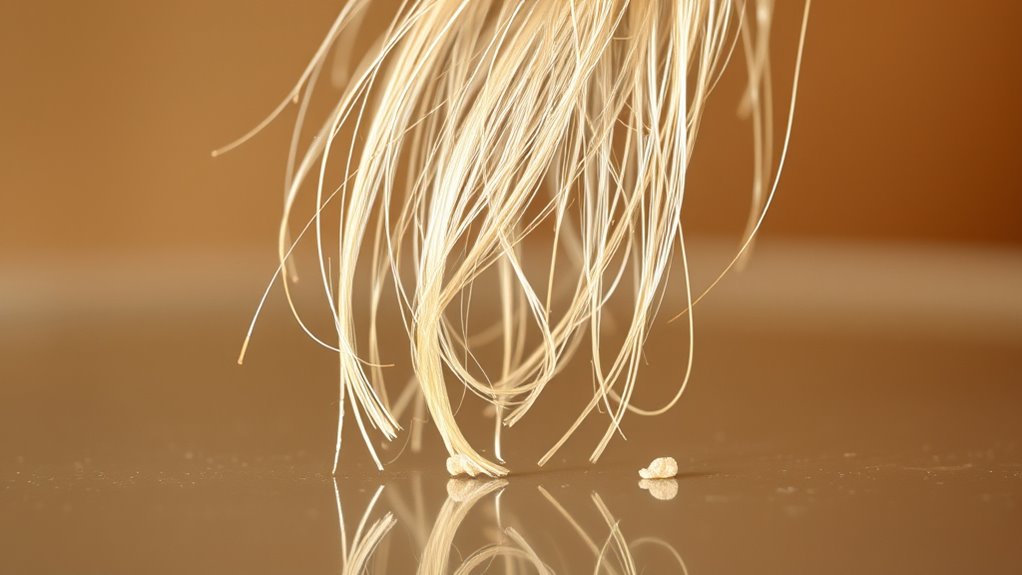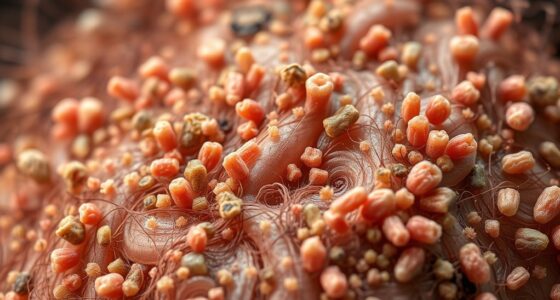Stress shedding, or telogen effluvium, happens when emotional or physical stress causes your hair follicles to pause growth and enter a resting phase. This leads to increased hair fall, often noticeable on brushes or pillows. Thankfully, this type of hair loss is usually temporary, and your hair can recover once stress levels decrease. To learn more about how stress affects your hair and ways to manage it, keep exploring this topic.
Key Takeaways
- Stress can push hair follicles into resting phase, causing increased shedding known as telogen effluvium.
- Telogen effluvium is temporary hair loss triggered by emotional or physical stress.
- It disrupts the natural hair growth cycle, leading to noticeable thinning and hair in brushes or pillows.
- Once stress decreases, hair follicles can recover and normal growth usually resumes.
- Managing emotional triggers and reducing stress support hair regrowth and overall well-being.

Have you ever wondered how some people seem to let go of stress almost effortlessly? It’s like they have a secret superpower for staying calm and collected, even when life throws challenges their way. For many, stress can feel overwhelming, triggering a cascade of physical reactions that affect more than just their mood. One common but often misunderstood issue is hair shedding, especially when you think you’re doing everything right with your hair care routine. You might have heard hair growth myths suggesting that certain shampoos or vitamins can instantly stop hair loss, but the truth is more complex. What really causes significant hair shedding in stressful times is something called telogen effluvium, a temporary condition where your hair prematurely enters the shedding phase. It’s important to recognize that emotional triggers, like anxiety, grief, or extreme stress, can disrupt your hair’s natural growth cycle. When your body perceives stress as a threat, it releases stress hormones such as cortisol, which can push hair follicles into a resting state. This means fewer hairs are growing, and more are falling out, often in clumps or noticeable thinning.
But understanding these emotional triggers is key. When you’re under constant stress, your body prioritizes essential functions for survival over hair growth, which isn’t essential in the moment. This is why stress shedding can happen suddenly and seem to come out of nowhere. You might notice more hair in your brush or on your pillow, and it can be alarming. The good news is that telogen effluvium is usually temporary. Once the stress diminishes, your hair follicles can bounce back, and normal growth resumes. Additionally, proper self-care and healthy habits can support your body’s recovery process. However, it’s important to address the emotional triggers that caused the shedding in the first place. Managing stress through techniques like mindfulness, meditation, or talking to someone you trust can help reduce cortisol levels and support your hair’s recovery.
Many people believe that hair loss is solely genetic or linked to poor nutrition, but stress-induced shedding shows how powerful emotional health is for your physical appearance. Don’t fall for hair growth myths that promise quick fixes—your body needs time, patience, and proper care. Focus on reducing your stress, eating a balanced diet, and maintaining a gentle hair care routine. Remember, your hair’s health is a reflection of your overall well-being, and addressing emotional triggers can be a critical step toward restoring your hair and confidence.
Frequently Asked Questions
Can Telogen Effluvium Cause Permanent Hair Loss?
You might wonder if telogen effluvium causes permanent hair loss. Usually, it doesn’t, since it’s a temporary shedding triggered by stress or illness. However, if the shedding is prolonged or severe, it could lead to permanent damage, especially if genetic factors are involved. To prevent lasting effects, address the underlying cause swiftly and consult a specialist. Early intervention helps ensure your hair can recover fully over time.
How Long Does Stress-Related Hair Shedding Last?
Stress-related hair shedding usually lasts for about three to six months after the stressful event. During this time, your hair goes through a shedding phase, but you can expect hair regrowth once the stress subsides. To support this process, focus on stress management techniques like exercise, meditation, and proper nutrition. Staying patient and consistent with your hair care will help your hair return to its normal growth cycle.
Are There Effective Treatments for Stress-Induced Hair Loss?
You might worry there’s no fix for stress-induced hair loss, but that’s not true. Effective treatments often include lifestyle modifications like managing stress and improving diet. Alternative therapies, such as acupuncture or herbal supplements, can also support hair regrowth. Staying consistent with these approaches helps, and patience is key. Addressing stress and adopting healthier habits can markedly improve hair health over time.
Can Diet or Supplements Improve Telogen Effluvium?
You might wonder if dietary changes or nutritional supplements can help with telogen effluvium. They can support your hair recovery by providing essential nutrients like iron, zinc, and biotin. Focus on eating a balanced diet rich in vitamins and minerals, and consider supplements if your diet’s lacking. While these steps won’t cure it overnight, they can promote healthier hair growth and strengthen your hair over time.
Is Telogen Effluvium Different From Other Hair Loss Types?
You might think all hair loss looks the same, but telogen effluvium is quite different from baldness. While baldness involves permanent follicle damage, telogen effluvium is a temporary hair shedding mechanism triggered by stress or illness. So, instead of permanent loss, you’re experiencing a shedding phase. Recognizing these differences helps you understand that not all hair loss is the same, and some cases can improve naturally.
Conclusion
Imagine your hair shedding so wildly that your head looks like a plucked chicken, all because of stress! But don’t panic—this is just temporary. Once you manage your stress and give your scalp some love, your hair will bounce back faster than you can say “shedding stopped!” Remember, you hold the power to turn this hair-raising chapter around. Stay calm, be patient, and watch your luscious locks return like a victorious crown!









